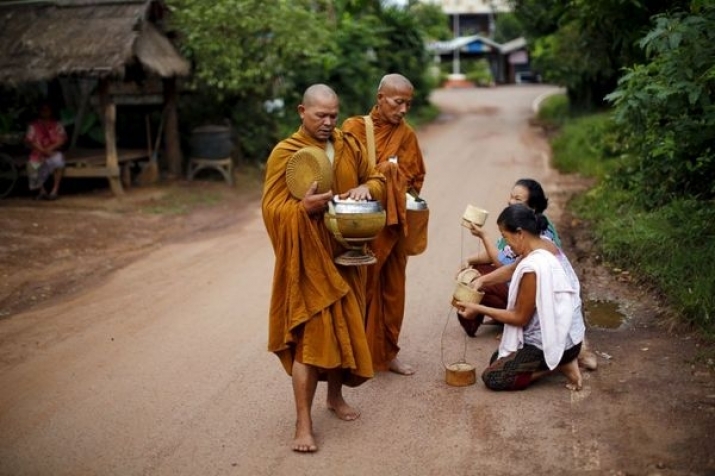NEWS
Buddhist Groups Push to Make Buddhism Thailand’s Official Religion
 Some Thai Buddhists fear establishing an official religion would help Thailand’s military government consolidate its hold on power. From csmonitor.com
Some Thai Buddhists fear establishing an official religion would help Thailand’s military government consolidate its hold on power. From csmonitor.comAs a drafting committee appointed by Thailand’s military-led government works to draw up the country’s 20th constitution in less than a century, several Buddhist activist groups are renewing an earlier call for Buddhism to be recognized as the kingdom’s official state religion. Supporters of the campaign are also pushing for the government to pass bills to protect Buddhism with stiff penalties, such as jail terms for monks whose conduct causes “harm and disgrace” to the religion.
A bid in 2007 to make Buddhism Thailand’s state religion, backed by a petition signed by 300,000 supporters, was rejected by the Constitution Drafting Assembly established by a previous military government. Although the 2007 constitution did not recognize a state religion, it did require the state to patronize and protect Buddhism. Data for 2010 from the Washington, D.C.-based Pew Research Center indicated that 93.2 per cent of Thais identify as Buddhist, with Theravada Buddhism by far the dominant form of Buddhism practiced in Thailand. Although the country has no official state religion, the king is required by law to be Theravada Buddhist.
“No government has ever taken an interest in Buddhism, resulting in a decline in the religion,” said Korn Meedee, the secretary of a group seeking to promote Buddhism as the state religion. “We want to eradicate non-pure forms of Buddhism, such as using the religion for commercial purposes, as well as the use of Hindu statues inside Buddhist temples,” he said, adding that the move would not infringe on the rights of other religions. (Bangkok Post)
In the past week, the group has distributed 100,000 petition forms in all of the country’s 76 provinces—except the Muslim-majority provinces of Narathiwant, Pattani, and Yala. The law requires 10,000 supporting signatures for the proposal of a draft bill, but Korn hopes the campaign will attract more than 1 million signatures.
Phra Narupchai Apinunto, a monk who heads an organization to protect Buddhism in Thailand’s restive southern provinces, said the religion was under threat in the southern border provinces, where monks, soldiers, and members of the public have been the target of deadly attacks by Muslim separatist insurgents. Phra Narupchai said Buddhists in the area lived in fear and needed a way to protect their religion.
However, some Thai Buddhists are concerned that establishing an official religion would help Thailand’s current military government further consolidate its legitimacy and grip on power.
Buddhist scholar Vichak Panich warned that such a move could result in Thailand becoming a semi-religious state. “The state will be able to use this as a tool to create a sense of sacredness for itself in the same way as the lèse majesté law is used,” he said, adding that if the movement succeeded, laws that violated the freedom and rights of the Thai public would inevitably follow. (Bangkok Post)
Thailand’s King Bhumibol Adulyadej, who ascended to the throne in 1946, is the world’s longest-reigning monarch. Widely revered in Thailand, he is protected by some of the most stringent lèse-majesté laws in the world, the application of which has risen dramatically under military governance. During his birthday speech in 2005, however, the king himself spoke out against the misuse of such laws, saying that even he should not be considered above criticism.
Thailand’s present military government, led by retired army officer Prayut Chan-o-cha, took power in a coup in May last year. On 5 October this year, it appointed a committee to craft a new constitution after an earlier draft was rejected by almost all sides of the country’s political landscape, delaying a promised general election until at least 2017 and effectively achieving the military’s goal of prolonging its rule.
See more
Push to make Buddhism state religion (Bangkok Post)
Will Buddhism become Thailand's state religion? (The Christian Science Monitor)
Push to make Buddhism Thailand's state religion (The Times of India)
Thai junta picks panel to write constitution after draft rejected (Reuters)














